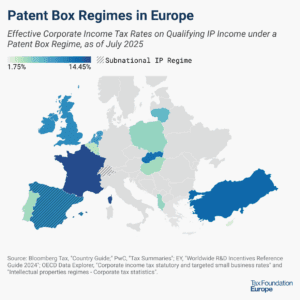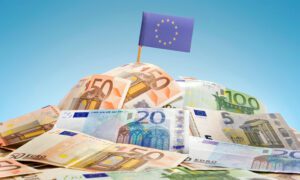
EU “Fiscal Fairness”
2 min readBy:“Tax fairness” has been a lingering theme in European Union policy circles since the 2008 financial crisis. Over time, the meaning of “taxA tax is a mandatory payment or charge collected by local, state, and national governments from individuals or businesses to cover the costs of general government services, goods, and activities. fairness” has expanded from combatting tax fraud and avoidance to promoting a certain vision of broader economic fairness. This vision has been primarily focused on taking from wealthy citizens and large corporations and giving to citizens at the poorer end of the economic spectrum.
Whether this is a desirable policy goal is a political question for European voters and policymakers. However, the problem with this framework is that it strictly narrows the scope of the “fairness” debate to the tax side of the fiscal equation, rather than considering both revenue-raising mechanisms (taxes) and redistributive mechanisms (spending).
It describes broad social inequities but only measures “fairness” by comparing tax contributions of certain people and entities. It implies that a policymaker cannot support social fairness while believing that a particular redistributive policy will hurt the economy. This one-sided focus distorts what fairness is, how to measure it, and the best way to achieve it.
Therefore, to more accurately describe economic fairness in the EU, policymakers should shift their thinking. Leaders should design policy based on a broader framework called “Fiscal Fairness” that holistically looks at economic relationships from both sides of the fiscal equation when deciding the overall “fair share” of taxes for a successful company or individual.
To be clear, “Fiscal Fairness” does not imply reducing tax rates to zero for successful businesses or individuals. Nor does it imply that tax progressivity is inherently an undesirable policy goal.
Rather, “Fiscal Fairness” acknowledges that fiscal contributions to society such as jobs created or capital investment are just as socially valuable, if not more, than the number of taxes applied to an entity or the tax rate of the highest tax bracket. It means that policymakers can believe in social and economic fairness while also believing that fairness is best achieved through principled, pro-growth tax policies rather than simple government redistribution.
Europe is facing difficult times. Governments are balancing the need for more resources with the need to maintain peace and prosperity domestically. To properly strike this balance, EU policymakers must incorporate “Fiscal Fairness” into the debate.
Share this article




